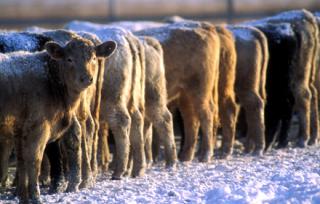
Nearly 6,200 cattle men and women are descending on Nashville, Tennessee, this week for the 2014 Cattle Industry Convention. And nearly every one of them got up early on Tuesday to hear from their single biggest customer: McDonald's.
Bob Langert, the VP of sustainability for Big M, told the packed convention hall to expect changes in the way McDonald's buys hamburger meat. And it buys a lot of it: 2% of the entire world's supply. Through its 34,000 world-wide franchise locations, it sells an average of 75 burgers PER SECOND, more than Wendy's, BK, Sonic, Arby's, and Jack-in-the-Box combined.
Sustainable is the word for this year, Langert told the beef producers, referencing his title. McDonald's recently determined that 28% of the carbon footprint of the entire company is related to the beef it sells."Just thinking you're sustainable isn't enough anymore," he said. "You've got to prove it."
He announced to the convention that McDonald's is organizing a sustainable beef roundtable initiative that will engage all parts of the industry, including producers, to define sustainable in ethical, environmental, and economic viability terms. By 2016, McDonald's intends to source and sell hamburger beef that fits the new criteria, whatever that is. "Sustainable should be like quality and safety," he said. The criteria will be applied world-wide, he said, whether the beef comes from the U.S., Argentina, or Australia.
In a Q&A session with beef producers, Langert was asked to define sustainable beef. "It's a comprehensive approach," he said, "but beyond that, we don't know the definition. You will help us create it. Let's do it before someone else does it for us."
Another questioner asked what beef producers can do to be more sustainable. "Well, start by measuring things," Langert said. "How much do you contribute to your community, and how much energy have you saved in the last few years? People want to know how much you care. That's part of the sustainable answer."
And another asked if consumers will be willing to pay more for the sustainable label. "Yes, a little now," said Langert. "And we think more in the future. We don't see sustainable as just a marketing ploy or gimmick. We think it is a way to drive more business to our stores because of our commitment. And that's good for you, too. We are engaging your industry leadership in this effort, and we are committed to collaborate with you and others.
"The biggest threat to our business and any other is if you don't listen to customers. We have 69 million customers come into our stores every day. We need to make beef ever more attractive to them. There are changes we can make in that direction, let's work together at them." As an example of change, he points to the variety of milk, yogurt, oatmeal, berries and more that you now see on McDonald's menu. "I don't believe all the things we see on our menu now. Our strategy in the last 10 years was to get better, and we found that when we did, we got bigger."
Cattlemen respond: What is sustainable?
Here are a few beef producer responses to McDonald's sustainable beef initiative.
Gerry Geis, Gillette, Wyoming, 250 cows: "I honestly don't know what he means. The beef business has been around hundreds of years, that's what I call sustainable. It's not going away. What's scary to me is when one of your biggest customers says they are going to buy on the basis of something that they can't define."
Ken Fowle, Etna, California, 85 cows: "Sustainable is when you can go on doing something for a long time. We're sustainable on our farm, I think the industry is, too. Maybe there are some people who will have to change the way they do things. If they're talking about feeding grain to cattle and whether that is sustainable, well, corn just went from $8 a bushel to $4, I think it got more sustainable."
Tim Munns, Snowville, Utah, 500 cows: "Sustainable is the buzzword of the day, but what I know is that nothing is sustainable unless it is both profitable and enjoyable. It won't continue if it is not. We enjoy the beef business, and it's been profitable, I think it will continue."
Don Anderson, Wendover, Utah, 300 cows: "As producers, we want a sustainable business, and we know what it takes on our ranches to sustain a livelihood. Consumers may see it differently, they may want a sustainable planet or something like that. So, our focus is different. Because of McDonald's size, they know what consumers are thinking better than we do as producers, so we should listen to them. We can't have blinders on. Most of us think we manage our ranches sustainably already, but if we have to take little steps to get in compliance, I think that is OK. For most cattlemen, it will be small steps, I think. My wife's family has 126 years of history on our ranch, I think that's already sustainable."





